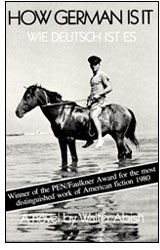Books |
How German Is It
Walter Abish
By
Published: Feb 19, 2009
Category:
Fiction
If everything were different, how different would it be?
That’s the kind of question that was fun to ponder late at night in college bull sessions.
It’s a little different when the question is asked about post-World War II Germany — by post-World War II Germans.
Sixty-five years after that war ended, this question only comes up when a German-born Pope lifts the excommunication of a Holocaust-denying bishop. Thirty years ago, however, when Walter Abish published How German Is It, that was still a hot topic — and it heated up a bit more when the novel won the PEN/Faulkner Award for fiction in 1981 (beating out Shirley Hazzard’s “The Transit of Venus”, Walker Percy’s “The Second Coming” and John Kennedy Toole’s “A Confederacy of Dunces”).
You probably don’t know of Walter Abish, largely because he writes what’s labeled “experimental” fiction. This is his most accessible book — and maybe his most personal. Born in Austria in 1931, Abish’s family fled from the Nazis, living in Italy, France, Shanghai and Israel. In 1957, he moved to the United States and became an American citizen.
In Abish’s novel, set in the 1970s, Germany also wants to become America; it craves suburban developments and shopping malls and all the glittery optimism that accompanies prosperity. There’s just the small problem of the past, of those sections of history that are neatly cordoned off and ignored — except, for example, when a guy in a leather jacket drinks too much beer and starts pounding the table.
Two brothers, Ulrich and Helmuth Hargenau, live in that divided state. Their father was executed by the Nazis after a 1944 plot against Hitler; he’s remembered as a hero. What “hero” means now — that’s something else. Helmuth, a successful architect, designs police stations and courts the press. Ulrich, a successful novelist, is haunted by all that isn’t said; he consorts with anarchists and, with his wife, gets involved in a terrorist plot.
As the novel begins, Ulrich has returned to Germany after six months in Paris. His past is checkered — thanks to his testimony, eight people are in jail — but he has no trouble returning. “The Hargenaus are decent, upstanding Germans. The best.”
Ulrich thinks about Brumhold, the most respected philosopher in Germany, who has formulated the key question of his time: How German is it? But no one loses sleep over the question, because it was posed by a thinker who was, like most Germans, silent during World War II. In fact, there’s a new town — Brumholdstein — named for him.
Small detail: Brumholdstein is being built on the site of a small concentration camp.
The brothers clash and banter. How can they not? Helmuth is all about moving forward, moving up. He’s not bothered at all when the mayor the mayor of Brumholdstein casually comments about a carpet: “My father acquired it before the war. Lots of things were quite reasonable before the war, I’m told.” Ulrich shudders at that — and everything else.
Halfway through what seems to be a novel of personalities and relationships, a water main breaks in Brumholdstein, and a terrible smell is everywhere. It’s not a sewer smell. It’s something else — you know what it is.
How upsetting it must be to have the dead confront you, decades after you’ve forgotten them and how they died.
How German is it? For that matter, how German are you? How German am I? These are questions that disturb and haunt. Which is what you expect from a Real Book.
To buy “How German Is It” from Amazon.com, click here.


